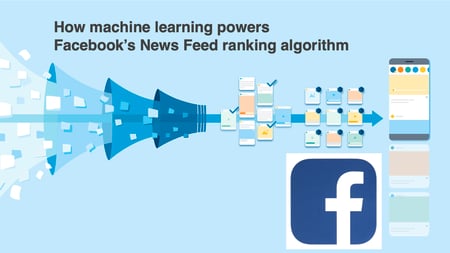 The Facebook engineering department just released an interesting post titled How machine learning powers Facebook’s News Feed ranking algorithm. The post provides new details about what I called one of the most destructive technologies ever invented in my blog post last week. Unfortunately, Facebook does not address the destructive nature of the News Feed Ranking Algorithm in the post.
The Facebook engineering department just released an interesting post titled How machine learning powers Facebook’s News Feed ranking algorithm. The post provides new details about what I called one of the most destructive technologies ever invented in my blog post last week. Unfortunately, Facebook does not address the destructive nature of the News Feed Ranking Algorithm in the post.
The authors of the Facebook post are correct when they say: “Without machine learning (ML), people’s News Feeds could be flooded with content they don’t find as relevant or interesting, including overly promotional content or content from acquaintances who post frequently, which can bury the content from the people they’re closest to.”
However, in their desire to tune the algorithm so its 2.7 billion global users have relevant content in their news feeds, Facebook has gone too far because the technology pushes people to see a too much of certain types of polarizing content once the system knows what they tend to interact with.
This means, as I said last week, that tens of millions of people are led into an abyss of misinformation, a quagmire of lies, and a quicksand of conspiracy theories.
My post last week generated a bunch of reaction from readers so I thought this glimpse into the Facebook technology would be fascinating for anyone who wants to dig deeper into what I believe is a massive problem for humanity.
Here are a few of the elements of the algorithm that lead to the problems I identified:
- “On Facebook, one concrete observable signal that an item has value for someone is if they click the like button.”
- “But is liking the only way [a user] expresses his preferences? Surely not. He might share articles he finds interesting, watch videos from his favorite game streamers, or leave thoughtful comments on posts from friends.”
- “Things get more mathematically complicated when we need to optimize for multiple objectives that all contribute to our overarching objective (creating the most long-term value for people).”
- “To complicate things further, for each person on Facebook there are thousands of signals we need to evaluate to determine what that person might find most relevant, so the algorithm gets very complex in practice.”
I'm calling on Facebook to address the destructive aspects of its News Feed Ranking Algorithm
Facebook users get hooked on the drug of seeing more and more of whatever they search for, click on, share or interact with in other ways. If you love birds, you see more birds.
If you are curious about a conspiracy theory your friend shared, click on it, and then find more similar content, Facebook will give you more and more. Those who are susceptible can end up trapped.
The last paragraph of the post reads: “Now that you understand the science, ranking architecture, and engineering behind News Feed more, you can see how our ranking algorithm helps create a valuable experience for people at previously unimaginable scale and speed.”
Yes, I do see that.
However, Facebook owes us so much more. Half the adult population on the planet use this technology and it is incredibly harmful.
I am calling on Facebook to explain what they are going to do about the destructive nature of this technology.
